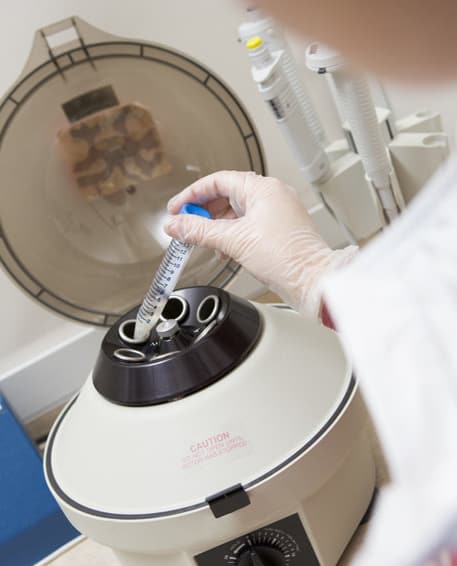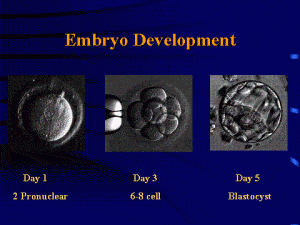About Embryo Cryopreservation
Embryo cryopreservation involves freezing embryos at sub-zero temperatures to preserve their viability for future pregnancies.
During an in vitro fertilization cycle (IVF), 10 or more eggs are removed from a woman’s ovaries and combined with a man’s sperm. As many as four eggs may be transplanted into the woman’s uterus.
The remaining embryos are then frozen (cryopreserved) in canisters of liquid nitrogen about 320 degrees Fahrenheit below zero.
About Egg Freezing
At The IVF CenterSM, embryos can be cryopreserved anywhere from the 2PN stage (24 hours after fertilization) to the blastocyst stage (day 5-6). They are frozen in labeled straws with a plastic topper that is also labeled with the patient’s name, birth date, date of retrieval and the stage of the frozen embryos.
The straws are heat sealed and placed in a plastic tube on an aluminum cane that is kept in liquid nitrogen. They are kept at -196°C and the levels of the liquid nitrogen are checked each day. Although they can be kept in this environment permanently, it is up to the patient to decide the disposition of embryos in the future.
Consent for embryo freezing or thawing must be provided prior to starting an IVF cycle. There are records kept of each embryo frozen or thawed and all information is confirmed before each process takes place.
IVF Frozen Embryo Transfer Research Study
Join our IVF Frozen Embryo Transfer Research Study to explore advancements in fertility and IVF treatments. Experience personalized care and innovative approaches that could make your dream of parenthood a reality. Qualified participants also receive reduced IVF costs.
About Egg Freezing
At The IVF CenterSM, embryos can be cryopreserved anywhere from the 2PN stage (24 hours after fertilization) to the blastocyst stage (day 5-6). They are frozen in labeled straws with a plastic topper that is also labeled with the patient’s name, birth date, date of retrieval and the stage of the frozen embryos.
The straws are heat sealed and placed in a plastic tube on an aluminum cane that is kept in liquid nitrogen. They are kept at -196°C and the levels of the liquid nitrogen are checked each day. Although they can be kept in this environment permanently, it is up to the patient to decide the disposition of embryos in the future.
Consent for embryo freezing or thawing must be provided prior to starting an IVF cycle. There are records kept of each embryo frozen or thawed and all information is confirmed before each process takes place.
Why The IVF CenterSM Is Unique
At The IVF CenterSM we recognize the process of IVF can at times be overwhelming.
To address this issue, we have an IVF Nurse available 24/7 to answer questions, guide you through the process, and provide emotional support. We also offer a Reproductive Health Psychologist to help couples develop their best coping strategies along their journey.
Success of the IVF Program at The IVF CenterSM is due to our scientific and technological excellence coupled with our compassionate and highly personalized approach to patient care.
The IVF CenterSM is committed to each couple’s success by providing individualized and supportive care along the way. We consider each couple part of our family as we attempt to help them create their own.






 At The IVF CenterSM, embryos can be cryopreserved anywhere from the 2PN stage (24 hours after fertilization) to the blastocyst stage (day 5-6). They are frozen in labeled straws with a plastic topper that is also labeled with the patient’s name, birth date, date of retrieval and the stage of the frozen embryos.
At The IVF CenterSM, embryos can be cryopreserved anywhere from the 2PN stage (24 hours after fertilization) to the blastocyst stage (day 5-6). They are frozen in labeled straws with a plastic topper that is also labeled with the patient’s name, birth date, date of retrieval and the stage of the frozen embryos.





